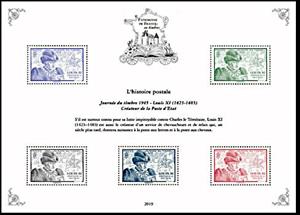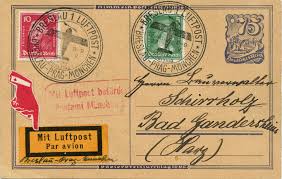Souvenir Sheet: Postal History: Louis XI (France 2019)
Postal History: Louis XI (France 2019)
16 September (France ) within release Treasures of Philately (2019) goes into circulation Souvenir Sheet Postal History: Louis XI face value 10.30 Euro
| Souvenir Sheet Postal History: Louis XI in catalogues | |
|---|---|
| Michel: | Mi: FR BL446 |
Souvenir Sheet is horizontal format.
Souvenir sheet with 5 stamps. Only sold jointly with the 9 other souvenir sheets of this 2019 series.Also in the issue Treasures of Philately (2019):
- Souvenir Sheet - Art and Letters: J. B. Carpeaux face value 10.30;
- Souvenir Sheet - Aviation: Jean Mermoz face value 10.30;
- Souvenir Sheet - France of Our Regions: Saint-Malo face value 10.30;
- Souvenir Sheet - French Architectural Heritage: Abbey of Hommes face value 10.30;
- Souvenir Sheet - French Red Cross: Cupid face value 10.30;
- Souvenir Sheet - Personalities of French History: Jean Jaurés face value 10.30;
- Souvenir Sheet - Postal History: Louis XI face value 10.30;
- Souvenir Sheet - Science and Technics: Barrage of Génissiat face value 10.30;
- Souvenir Sheet - Sports and Leisure: Chamonix - Mont Blanc face value 10.30;
- Souvenir Sheet - Stamp Cérès 1 Franc Vermilion face value 1;
- Souvenir Sheet - Transports: 13th International Railway Congress face value 10.30;
- Stamp - Art and Letters: J. B. Carpeaux face value 1.30;
- Stamp - Art and Letters: J. B. Carpeaux face value 1.30;
- Stamp - Art and Letters: J. B. Carpeaux face value 1.30;
- Stamp - Art and Letters: J. B. Carpeaux face value 3.80;
- Stamp - Aviation: Jean Mermoz face value 1.30;
- Stamp - Aviation: Jean Mermoz face value 1.30;
- Stamp - Aviation: Jean Mermoz face value 1.30;
- Stamp - Aviation: Jean Mermoz face value 1.30;
- Stamp - Aviation: Jean Mermoz face value 3.80;
- Stamp - France of Our Regions: Saint-Malo face value 1.30;
- Stamp - France of Our Regions: Saint-Malo face value 1.30;
- Stamp - France of Our Regions: Saint-Malo face value 1.30;
- Stamp - France of Our Regions: Saint-Malo face value 1.30;
- Stamp - France of Our Regions: Saint-Malo face value 3.80;
- Stamp - French Architectural Heritage: Abbey of Hommes face value 1.30;
- Stamp - French Architectural Heritage: Abbey of Hommes face value 1.30;
- Stamp - French Architectural Heritage: Abbey of Hommes face value 1.30;
- Stamp - French Architectural Heritage: Abbey of Hommes face value 1.30;
- Stamp - French Architectural Heritage: Abbey of Hommes face value 3.80;
- Stamp - French Red Cross: Cupid face value 1.30;
- Stamp - French Red Cross: Cupid face value 1.30;
- Stamp - French Red Cross: Cupid face value 1.30;
- Stamp - French Red Cross: Cupid face value 1.30;
- Stamp - French Red Cross: Cupid face value 1.30;
- Stamp - Personalities of French History: Jean Jaurés face value 1.30;
- Stamp - Personalities of French History: Jean Jaurés face value 1.30;
- Stamp - Personalities of French History: Jean Jaurés face value 1.30;
- Stamp - Personalities of French History: Jean Jaurés face value 1.30;
- Stamp - Personalities of French History: Jean Jaurés face value 3.80;
- Stamp - Postal History: Louis XI face value 1.30;
- Stamp - Postal History: Louis XI face value 1.30;
- Stamp - Postal History: Louis XI face value 1.30;
- Stamp - Postal History: Louis XI face value 1.30;
- Stamp - Postal History: Louis XI face value 3.80;
- Stamp - Science and Technics: Barrage of Génissiat face value 1.30;
- Stamp - Science and Technics: Barrage of Génissiat face value 1.30;
- Stamp - Science and Technics: Barrage of Génissiat face value 1.30;
- Stamp - Science and Technics: Barrage of Génissiat face value 1.30;
- Stamp - Science and Technics: Barrage of Génissiat face value 3.80;
- Stamp - Sports and Leisure: Chamonix - Mont Blanc face value 1.30;
- Stamp - Sports and Leisure: Chamonix - Mont Blanc face value 1.30;
- Stamp - Sports and Leisure: Chamonix - Mont Blanc face value 1.30;
- Stamp - Sports and Leisure: Chamonix - Mont Blanc face value 1.30;
- Stamp - Sports and Leisure: Chamonix - Mont Blanc face value 3.80;
- Stamp - Stamp Cérès 1 Franc Vermilion face value 1;
- Stamp - Transports: 13th International Railway Congress face value 1.30;
- Stamp - Transports: 13th International Railway Congress face value 1.30;
- Stamp - waagerechtes Paar face value 1.30;
- Stamp - waagerechtes Paar face value 1.30;
- Stamp - waagerechtes Paar face value 3.80;
- Stamp - waagerechtes Paar face value 1.30;
Souvenir Sheet Postal History: Louis XI it reflects the thematic directions:
Famous People refers to the fame and public attention accorded by the mass media to individuals or groups or, occasionally, animals, but is usually applied to the persons or groups of people (celebrity couples, families, etc.) themselves who receive such a status of fame and attention. Celebrity status is often associated with wealth (commonly referred to as fame and fortune), while fame often provides opportunities to make money.
King is the title given to a male monarch in a variety of contexts. The female equivalent is queen regnant (while the title of queen on its own usually refers to the consort of a king). In the context of prehistory, antiquity and contemporary indigenous peoples, the title may refer to tribal kingship. Germanic kingship is cognate with Indo-European traditions of tribal rulership (c.f. Indic rājan, Gothic reiks, and Old Irish rí, etc.) In the context of classical antiquity, king may translate Latin rex or either Greek archon or basileus. In classical European feudalism, the title of king as the ruler of a kingdom is understood as the highest rank in the feudal order, potentially subject, at least nominally, only to an emperor (harking back to the client kings of the Roman Empire). In a modern context, the title may refer to the ruler of one of a number of modern monarchies (either absolute or constitutional). The title of king is used alongside other titles for monarchs, in the West prince, emperor, archduke, duke or grand duke, in the Middle East sultan or emir; etc. Kings, like other royalty, tend to wear purple because purple was an expensive color to wear in the past.
Postal history is the study of postal systems and how they operate and, or, the study of the use of postage stamps and covers and associated postal artifacts illustrating historical episodes in the development of postal systems. The term is attributed to Robson Lowe, a professional philatelist, stamp dealer and stamp auctioneer, who made the first organised study of the subject in the 1930s and described philatelists as "students of science", but postal historians as "students of humanity". More precisely, philatelists describe postal history as the study of rates, routes, markings, and means (of transport).
A Royalty is the immediate family of a king or queen regnant, and sometimes his or her extended family. The term imperial family appropriately describes the family of an emperor or empress, and the term papal family describes the family of a pope, while the terms baronial family, comital family, ducal family, grand ducal family, or princely family are more appropriate to describe the relatives of a reigning baron, count, duke, grand duke, or prince. However, in common parlance members of any family which reigns by hereditary right are often referred to as royalty or "royals." It is also customary in some circles to refer to the extended relations of a deposed monarch and his or her descendants as a royal family. A dynasty is sometimes referred to as "the House of ...". As of July 2013, there are 26 active sovereign monarchies in the world who rule or reign over 43 countries in all




